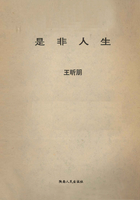means "to oversee."(6) So that he who loves to govern rather than to do good is no bishop.Accordingly no one is prohibited from the search after truth, for in this leisure may most laudably be spent; but it is unseemly to covet the high position requisite for governing the people, even though that position be held and that government be administered in a seemly manner.And therefore holy leisure is longed for by the love of truth; but it is the necessity of love to undertake requisite business.If no one imposes this burden upon us, we are free to sift and contemplate truth; but if it be laid upon us, we are necessitated for love's sake to undertake it.And yet not even in this case are we obliged wholly to relinquish the sweets of contemplation;for were these to be withdrawn, the burden might prove more than we could bear.
CHAP.20.--THAT THE SAINTS ARE IN THIS LIFE BLESSED IN HOPE.
Since, then, the supreme good of the city of God is perfect and eternal peace, not such as mortals pass into and out of by birth and death, but the peace of freedom from all evil, in which the immortals ever abide; who can deny that that future life is most blessed, or that, in comparison with it, this life which now we live is most wretched, be it filled with all blessings of body and soul and external things? And yet, if any man uses this life with a reference to that other which he ardently loves and confidently hopes for, he may well be called even now blessed, though not in reality so much as in hope.But the actual possession of the happiness of this life, without the hope of what is beyond, is but a false happiness and profound misery.For the true blessings of the soul are not now enjoyed; for that is no true wisdom which does not direct all its prudent observations, manly actions, virtuous self-restraint, and just arrangements, to that end in which God shall be all and all in a secure eternity and perfect peace CHAP.21.--WHETHER THERE EVER WAS A ROMAN REPUBLIC ANSWERING TO THEDEFINITIONS
OF SCIPIO IN CICERO'S DIALOGUE.
This, then, is the place where I should fulfill the promise gave in the second book of this work,(1) and explain, as briefly and clearly as possible, that if we are to accept the definitions laid down by Scipio in Cicero's De Republica, there never was a Roman republic; for he briefly defines a republic as the weal of the people.And if this definition be true, there never was a Roman republic, for the people's weal was never attained among the Romans.For the people, according to his definition, is an assemblage associated by a common acknowledgment of right and by a community of interests.And what he means by a common acknowledgment of right he explains at large, showing that a republic cannot be administered without justice.Where, therefore, there is no true justice there can be no right.For that which is done by right is justly done, and what is unjustly done cannot be done by right.For the unjust inventions of men are neither to be considered nor spoken of as rights; for even they themselves say that right is that which flows from the fountain of justice, and deny the definition which is commonly given by those who misconceive the matter, that right is that which is useful to the stronger party.Thus, where there is not true justice there can be no assemblage of men associated by a common acknowledgment of right, and therefore there can be no people, as defined by Scipio or Cicero; and if no people, then no weal of the people, but only of some promiscuous multitude unworthy of the name of people.Consequently, if the republic is the weal of the people, and there is no people if it be not associated by a common acknowledgment of right, and if there is no right where there is no justice, then most certainly it follows that there is no republic where there is no justice.Further, justice is that virtue which gives every one his due.Where, then, is the justice of man, when he deserts the true God and yields himself to impure demons?
Is this to give every one his due? Or is he who keeps back a piece of ground from the purchaser, and gives it to a man who has no right to it, unjust, while he who keeps back himself from the God who made him, and serves wicked spirits, is just?
This same book, De Republica, advocates the cause of justice against injustice with great force and keenness.The pleading for injustice against justice was first heard, and it was asserted that without injustice a republic could neither increase nor even subsist, for it was laid down as an absolutely unassailable position that it is unjust for some men to rule and some to serve; and yet the imperial city to which the republic belongs cannot rule her provinces without having recourse to this injustice.It was replied in behalf of justice, that this ruling of the provinces is just, because servitude may be advantageous to the provincials, and is so when rightly administered,--that is to say, when lawless men are prevented from doing harm.And further, as they became worse and worse so long as they were free, they will improve by subjection.To confirm this reasoning, there is added an eminent example drawn from nature: for "why," it is asked, "does God rule man, the soul the body, the reason the passions and other vicious parts of the soul?" This example leaves no doubt that, to some, servitude is useful; and, indeed, to serve God is useful to all.And it is when the soul serves God that it exercises a right control over the body; and in the soul itself the reason must be subject to God if it is to govern as it ought the passions and other vices.Hence, when a man does not serve God, what justice can we ascribe to him, since in this case his soul cannot exercise a just control over the body, nor his reason over his vices? And if there is no justice in such an individual, certainly there can be none in a community composed of such persons.















